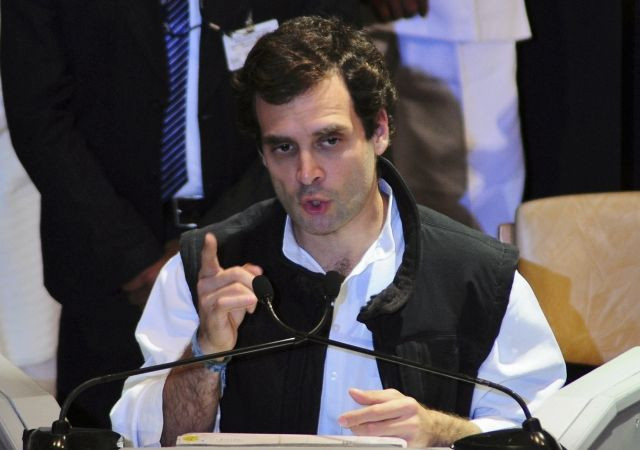Irony, Thy Name Is Rahul Gandhi

Rahul Gandhi, the newly appointed vice president of India’s ruling Congress party and often dubbed the party’s “Prince Charming,” managed to send across at least one message during his maiden speech after assuming the position over the weekend — that he lacked a sense of irony.
Condemning elitism as the “tragedy of India,” Rahul, whose mother Sonia Gandhi is the president of the party, said: "A handful of people control the entire political space. We don't respect knowledge, we respect position.”
"It doesn't matter how much wisdom you have. If you don't have position, you have nothing. That's the tragedy of India.”
“Power is grossly centralized in our country. We only empower people at the top of a system. We don’t believe in empowering people all the way to bottom. Every single day I meet people who have tremendous understanding and deep insight, but no voice.”
It’s remarkable that he didn’t cringe when he delivered his ideas of decentralizing power in the world’s largest democracy, completely overlooking the fact that his mother, by virtue of being the widow of assassinated former Prime Minister Rajiv Gandhi, had almost become the prime minister after the 2004 general elections, before filling that seat with a non-politician, Manmohan Singh.
While there has never been any lack of criticism directed at the Congress for its “Chamchagiri” (which translates to “Sycophancy”) and the Nehru-Gandhi dynasty for hijacking Indian politics with a steady supply of prime ministerial candidates for the party, Rahul has particularly been slammed for lacking in qualities that cannot be done away with for a politician.
“Rahul Gandhi is completely mediocre,” Ramachandra Guha, one of the most eminent Indian historians whose works include “India After Gandhi: The History Of The World's Largest Democracy,” told FirstPost in an interview late last year.
“Rajiv at least had a vision — of making India a technologically sophisticated society. Sonia has enormous stamina and determination. Rahul has no original ideas, no heart for sustained and hard work. He should find another profession,” Guha had said.
Rahul Gandhi entered politics in 2004 and became a legislator from Amethi parliamentary constituency in the northern state of Uttar Pradesh. The seat was held by his mother until she shifted to a neighboring constituency.
Even if you are willing to overlook how power has been spoon-fed to Gandhi, his past records while he was charge of the party youth wing, reeks of favoritism and dynasty politics.
In the cabinet reshuffle in October, one of the closest political aides of Gandhi, Jitendra Singh was given independent charge of the Ministry of Youth Affairs and Sports and was made Minister of State (MoS) for Defense, a promotion from his former status as MoS (Home).
Jitin Prasada, Sachin Pilot and Jyotiraditya Scindia were also promoted — all of them known to be close to Rahul.
What else do these four have in common? All of them are just like Rahul — “young” heirs to the political power passed from general to generation within their families.
Singh, the scion of Alwar royal family, is the grandson of Sir Tej Singh Prabhakar (1911-2009), the last ruling Maharaja (ruler) of Alwar. Singh was born as the "Bhanwar" (son of the Crown Prince) in the royal family of Alwar in Rajasthan and became the heir apparent when his father died in 1976.
Jitin Prasada, the son of the late Congress stalwart Jitendra Prasada, quit his corporate job after the death of his father and subsequently helped his mother contest the election. His Kapurthala royal lineage gave him what the Samajwadi Party’s Shashank Yadav calls a “touch-me-not” image, far removed from that of a commoner.
Sachin Pilot was thrust into politics following the sudden death of his father and Congress leader Rajesh Pilot, while Jyotiraditya Scindia is the son of Prince-turned-politician, Madhavrao Scindia.
This picture doesn't exactly have any "aam aadmi" (commoner) whose participation in the political process Gandhi strongly advocated in his emotional speech after becoming the party vice president.
Describing Rahul as the “heir to the monarchic democracy of India,” key opposition Bharatiya Janata Party (BJP) leader and eminent lawyer Ram Jethmalani wrote in the Sunday Guardian, referring to his “democratization” of the Youth Congress: “Poor boy, the contradictions and injustices of his life, and the varied conflicts of interest implicit in his political destiny must make him disoriented.”
In his nine years of political life, Rahul has given the nation goosebumps by dining and sleeping in the humble abodes of tribal people or traveling by train from New Delhi to Mumbai, only to drain all the goodwill with long conspicuous silences in the face of national turmoil.
“Disoriented” or not, Gandhi can no longer resort to his favorite “hide-and-seek” game, because discussions are already heating up over his prime ministerial prospects as the general elections are due next year.
© Copyright IBTimes 2024. All rights reserved.






















